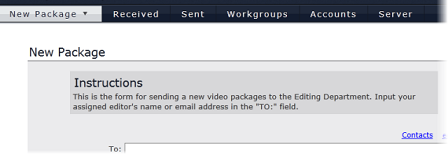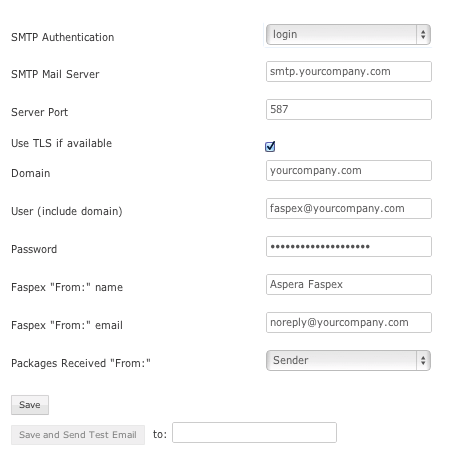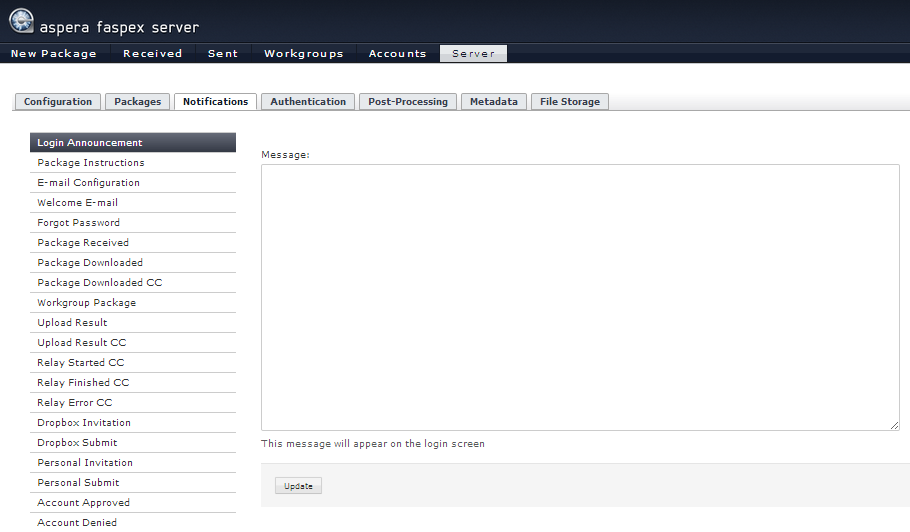As a Aspera Faspex Server Administrator, you can communicate with your users regarding
various events using the Aspera Faspex "Notifications" feature. This topic describes the types
of notifications available within Aspera Faspex. To get started, go to within the Aspera Faspex Web UI.
IMPORTANT NOTE: Notification types 4 through 20, below, utilize the same editing
interface and only vary in content. When you select one of these notification types,
you can edit its respective content by clicking the Customize Using
Template or Edit HTML links. The Customize
Using Template option enables you to create an email template using a form
(which includes the ability to insert text strings), while the Edit
HTML allows you to create an email template with HTML code. Do not use HTML
or the < and > symbols when editing content via
Customize Using Template! You will find a list of each notification
type's available text strings below this table.
| # |
Notification Type |
Description |
| 1 |
Login Announcement |
Post an announcement for users on your organization's Aspera Faspex login page. Once
saved, your announcement message will appear on the login page, as shown below.
|
| 2 |
Package Instructions |
Post instructions for users who are sending new, normal packages (i.e., NOT dropbox
packages). Once saved, your instructions will appear on the Aspera Faspex normal "New
Package" screen (example is shown below).

IMPORTANT NOTE:
Dropbox package instructions can be created and/or edited from the menu (see the Instructions for submitters field in the topic Create and Manage Dropboxes).
|
| 3 |
E-mail Configuration |
Input your email (SMTP) server settings for sending notifications from Aspera
Faspex. Settings include the following:
- SMTP Authentication: Open or login
- SMTP Mail Server
- Server Port
- Use TLS if available: Enable or disable. Please refer to the IMPORTANT NOTE
below.
- Domain
- User: The email account that you are sending the notification from (be sure to
include the domain).
- Password: The email account's password.
- Aspera Faspex "From" name: The "from" name that appears on Aspera Faspex-generated
emails.
- Aspera Faspex "From" email: The "from" email address that appears on Aspera
Faspex-generated emails.
- Packages received "From": Choose from Sender, Aspera Faspex, Sender via Aspera
Faspex. If Sender is selected, package notifications will show as being
received from "Sender's Name." If Faspex is selected, package notifications
will show as being received from "Faspex." If Sender via Faspex is selected,
package notifications will show as being received as the "Sender's Name via
Faspex."
IMPORTANT NOTE ON TLS: Aspera Faspex will confirm whether or not the name in
your TLS security certificate matches your mail server's configured address (fully
qualified domain name and/or IP address). If it does not, you will receive an error.
If your fully qualified domain name does not resolve with your internal DNS, you must
add the IP address and name to your /etc/hosts file (or ensure the
name resolves using DNS).

IMPORTANT NOTE: If your Aspera Faspex Server is configured to identify itself
by IP address (rather than by domain name), then the URLs in your notification emails
will contain an IP address (e.g. "https://10.0.0.1/aspera/faspex"). Some Web-based
email services (e.g. Yahoo or Ymail, Hotmail, etc.) have been known to automatically
flag emails containing IP address links as "Spam," and will move them to your
Junk/Spam folder. For this reason, Aspera recommends creating a domain name for your
Aspera Faspex Server. If you do not have a domain name immediately available, then you
can initially configure Aspera Faspex with an IP address and then change it to use a
domain name later. If you know that you will not be setting up a domain name, then
make sure that users add your Aspera Faspex "From" email address (e.g.
faspex_admin@yourcompany.com) to their address book and/or contact list. Doing so
typically "white-lists" the address so that emails from your Aspera Faspex Server are
not automatically flagged and routed to your users' Junk/Spam boxes.
To debug your SMTP server settings, enter your email address in the
Save and Send Test Email text field, and click the button to
send a test email.
|
| 4 |
Welcome E-mail |
Informs a user that his or her account is ready for use, and includes steps to get
started. Jump to text
strings. |
| 5 |
Forgot Password |
Allows a user to reset his or her password. A user can request to have this email
sent from the login screen. Jump to
text strings. |
| 6 |
Package Received |
Informs users when they receive packages. Jump to text
strings. |
| 7 |
Package Downloaded |
Informs users when a sent package has been downloaded. For details, see Note on Download
Notifications below. Jump
to text strings. |
| 8 |
Package Downloaded CC |
Informs anyone copied on a package download when someone downloads the package. For
details, see Note on Download
Notifications below. Jump
to text strings. |
| 9 |
Workgroup Package |
Informs users when packages are sent to workgroups they belong to. Jump to text strings. |
| 10 |
Upload Result |
Sent to a package sender or dropbox submitter when the upload ends, providing
information on whether it completed successfully or not. Jump to text
strings. |
| 11 |
Upload Result CC |
Sent to anyone copied on a package upload, providing information on whether it
completed successfully or not. Jump to text strings. |
| 12 |
Relay Started CC |
Start of the file relay transfer. Everyone on the CC list gets notified that a file
relay transfer has started. |
| 13 |
Relay Finished CC |
End of the file relay transfer. Everyone on the CC list gets notified that a file
relay transfer has completed. |
| 14 |
Relay Error CC |
An error occurred in the file relay. Everyone on the CC list gets notified that a
file relay error has occurred. |
| 15 |
Dropbox Invitation |
Sent to outside users when invited to submit to a dropbox. Jump to text strings. |
| 16 |
Dropbox Submit |
Sent when an outside user submits a package to a dropbox. Jump to text
strings. |
| 17 |
Personal Invitation |
Sent to outside users after submitting their email address via the public URL
feature. This invitation contains a private link for package submission. Jump to text
strings. |
| 18 |
Personal Submit |
Sent to outside users after they have submitted a package via a user's or
workgroup's public URL. It also provides them with information for checking their package
status. Jump to text
strings. |
| 19 |
Account Approved |
Prompts new, self-registered users to activate their accounts by resetting the
password. Jump to text
strings. |
| 20 |
Account Denied |
Sent to an account requester when the requested account has been denied by an
Administrator. Jump to text
strings. |



